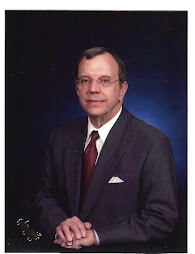Having weathered these past few months of presidential campaign rhetoric from both sides to the point of numbness, I, like most Americans, can hardly wait until the results of November 6th become history and we can then focus our attention on the many other important issues facing our country. However, one thing that this particular campaign has caused me to focus on is a question I have pondered for many years and that is "do businessmen really make great political leaders"?
My first experience with this even being an issue was in 1966 when Raymond Rebsamen, a much respected business leader in our state ran for governor of Arkansas. I vividly remember being impressed with his campaign vision of "Reach with Rebsamen" which projected him as one who had been very successful in the business world and wanted to bring that same talent and acumen to state government and make it more efficient. As a young man trying to develop my own business career, his message had great resonance with me so I voted for him. He ultimately lost to another well known and successful businessman, Winthrop Rockefeller, a Republican, who Mr. Rebsamen, a Democrat, himself described as someone who "served our state well", and he did. Subsequently, we have had a series of businessmen who have sought that same office with a mixed bag of successes and failures.
But throughout these many election cycles both at the state and national level, I cannot recall when there has been as much emphasis placed on business experience being such a dominant qualifier as in the current presidential election. It's as if one's personal net worth is the only thing that counts. The main thing wrong with that criterion is that there is another side to businessmen that does not always render them as being the best qualified to serve in public office. For starters, many seem to share the same linear mindset of maximizing profits at all cost, as well as possessing the singular power to make whatever decisions are necessary to achieve that end, with little or no responsibility to answer for their actions other than to their boards of directors, all of whom have been chosen by them. If labor costs can be reduced in another country, go there. If an employee's production quota goes down, fire him. If a plant is not profitable, close it. There is no public debate about these decisions or their impact on communities, society or national loyalty. They are just simply coldly calculated business decisions based on one's sole desire to increase the bottom line. Seemingly built into the DNA of these same corporate executives is a tendency to bark an order and expect immediate compliance by all underlings, no questions asked. The problem with applying these same business executive attributes to government is that a whole slew of other considerations have to be factored into the decision making process because the end result is a broad public policy that applies to all citizens and not just a single corporate enterprise.
For one, there is a vast body of laws, rules and regulations that have been established by congress over the past 250 years, not to mention the Constitution, that must be respected and adhered to in making such decisions. What's good for the bottom line does not always translate into what's best for the public at large. Just witness the $16 trillion debt that has accrued over two administrations for a variety of complex reasons not to be explained here, but clearly resulted in funding many things important to the fabric of America, including stabilizing the economy and supporting social programs for those in need, both significant and valid roles of government. To address these many needs of a nation requires formulating sound and reasonable public policy issues, getting the support of the American people and then persuading a wildly divergent group of other elected officials to approve these initiatives. In other words, it requires political tact to form a consensus, artful skills not necessarily developed in corporate America. Just think of it this way, if America were a corporation run by a business executive, we would have been declared bankrupt, shut down and sold off in pieces to the highest bidder long ago. Consequently, just running government operations in the most efficient manner financially, particularly in stressful economic times like we have experienced these past four years, is not the primary role of government, as there are way too many other responsibilities which have to be met that may not always pass the cost/benefit test often times used in the business world.
The contrast between these two approaches to the decision making process could not have been more clearly demonstrated than during the last two presidential debates where aggression appears to have been the measure by which effective leadership was being judged. Debate rules to which both candidates had agreed, including not invading each others' space, no pointing fingers at your rival and refraining from asking each other questions, were blindly ignored, principally by the one participant who keeps touting his business credentials. Hopefully, our nation will be spared such rude bullyism in next Tuesday's final debate and we will be allowed to gauge the true, meaningful and relevant qualifications of the two candidates in a calm and rational environment. As James Lipton, Dean Emeritus of the Actors Studio in New York, most notably concluded this week on MSNBC's October 17th, HARDBALL program, "Do we want a president, or do we want a boss?"
Friday, October 19, 2012
Subscribe to:
Comments (Atom)
